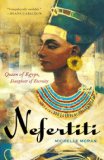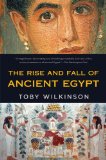Summary | Excerpt | Reading Guide | Reviews | Beyond the book | Read-Alikes | Genres & Themes | Author Bio

A Novel
by Michelle MoranLove, betrayal, political unrest, plague, and religious conflict — Nefertiti brings ancient Egypt to life in vivid detail. Fast-paced and historically accurate, it is the dramatic story of two unforgettable women living through a remarkable period in history.
Nefertiti and her younger sister, Mutnodjmet, have been raised in a powerful family that has provided wives to the rulers of Egypt for centuries. Ambitious, charismatic, and beautiful, Nefertiti is destined to marry Amunhotep, an unstable young pharaoh. It is hoped by all that her strong personality will temper the young Amunhotep’s heretical desire to forsake Egypt’s ancient gods, overthrow the priests of Amun, and introduce a new sun god for all to worship.
From the moment of her arrival in Thebes, Nefertiti is beloved by the people. Her charisma is matched only by her husband’s perceived generosity: Amunhotep showers his subjects with lofty promises. The love of the commoners will not be enough, however, if the royal couple is not able to conceive an heir, and as Nefertiti turns her attention to producing a son, she fails to see that the powerful priests, along with the military, are plotting against her husband’s rule. The only person wise enough to recognize the shift in political winds—and brave enough to tell the queen—is her younger sister, Mutnodjmet.
Observant and contemplative, Mutnodjmet has never shared her sister’s desire for power. She yearns for a quiet existence away from family duty and the intrigues of court. Her greatest hope is to share her life with the general who has won her heart. But as Nefertiti learns of the precariousness of her reign, she declares that her sister must remain at court and marry for political gain, not love. To achieve her independence, Mutnodjmet must defy her sister, the most powerful woman in Egypt—while also remaining loyal to the needs of her family.
Love, betrayal, political unrest, plague, and religious conflict—Nefertiti brings ancient Egypt to life in vivid detail. Fast-paced and historically accurate, it is the dramatic story of two unforgettable women living through a remarkable period in history.
An addictively engrossing epic that brings to life a fascinating time and place - a good choice for book clubs and lovers of historical fiction...continued
Full Review
(311 words)
This review is available to non-members for a limited time. For full access,
become a member today.
(Reviewed by BookBrowse Review Team).
Interesting Links:
This "beyond the book" feature is available to non-members for a limited time. Join today for full access.

If you liked Nefertiti, try these:

by Paula McLain
Published 2016
The extraordinary adventures of a woman before her time, the exhilaration of freedom and its cost, and the tenacity of the human spirit.

The Rise and Fall of Ancient Egypt
by Toby Wilkinson
Published 2013
In this landmark work, one of the world’s most renowned Egyptologists tells the epic story of this great civilization, from its birth as the first nation-state to its final absorption into the Roman Empire—three thousand years of wild drama, bold spectacle, and unforgettable characters.



I always find it more difficult to say the things I mean than the things I don't.
Click Here to find out who said this, as well as discovering other famous literary quotes!